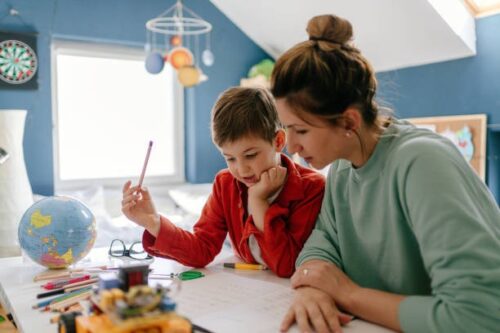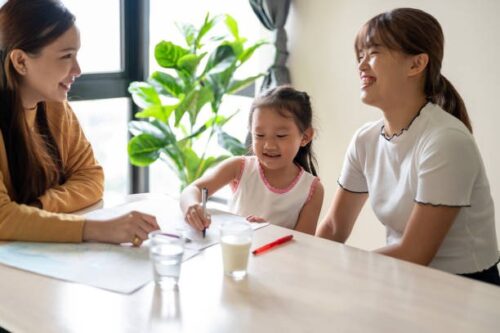You might be shocked to learn that factors outside of the classroom significantly impact a student’s education. Parent involvement in the learning environment with providing feedback is an important element that can significantly increase academic achievement. Numerous studies show that children with actively involved parents do better academically, attend school more frequently or every day of the week, behave better, and have stronger social skills.

To raise student involvement and improve learning results, schools should focus on involving parents because they are vital to the growth and development of their children. Thus, discussing how schools may create a supportive learning environment and strengthen parent-teacher relationships is also important.
What Is A Parent-Teacher Collaboration?
Collaboration between parents and teachers is crucial to a student’s educational experience and academic success. A student’s parents and their child’s teacher can collaborate to establish a rapport, help students with exam stress management, and provide support and the best possible learning environment at school and home. This will allow the flow of positive feedback in both parties as they make way for the betterment of the collaboration with parents.
Parents and teachers must establish communication between them. In addition, they can offer encouragement and assistance to the learners to help them develop their best academic function. They can also identify potential contributing factors and develop a strategy to take action that targets the student’s points of weakness.
For instance, if a learner is having arithmetic difficulties and hasn’t necessarily mentioned the challenges to their family, the family can find out from the instructor. From there, the two (parent and teacher) can collaborate to improve the learning environment that suits the child’s needs.
This could entail the student and the teacher spending extra one-on-one time, the family working together on projects at home to complement the student’s classroom instruction, or even acquiring a private instructor or tutor.
However, the family can notify the instructor if a pupil is having difficulties in class as a result of issues and concerns at home. Suppose the instructional professional is still determining whether anything at home bothers the student. In that case, they can also question the parents or the family members if that information needs to be given.
The instructor and parents can have a better understanding and discuss the problem and develop a strategy to support the student during a difficult period if they have an excellent connection and can establish trust within them.
Educators are frequently expected to be clairvoyant when it comes to their learners. However, the instructor can get the knowledge required to support the pupil’s needs by developing a close working connection with a student’s parents, guardians, or other family members.
The Importance Of Parent Involvement
Learners must understand that student’s progress in academic is supported by their instructors and parents working together. One method parents might use to achieve this is by assigning homework. Parents can better understand what their youngsters are learning in school with the help of homework.
Parents may ensure their kid produces their best work by reviewing it and offering further assistance. Moreover, homework is a useful tool for reinforcing concepts learned in class. Therefore, parents and educators must devise strategies for inspiring pupils to want to finish it.
- Establishing a rapport and a foundation of trust with the student’s family.
- Establishing channels of communication that facilitate the learner’s learning experiences.
- Making the classroom a more inviting place for students to learn.
- Learning more about the learner’s educational background and style.
- Fostering communication between the parent/teacher and the student to ensure everyone knows the kid’s objectives and skills.
- Keeping parents informed on the social and educational growth of their children.

Parent-Teacher Collaboration
Educators can support children’s learning and well-being by collaborating with parents or guardians. Learners’ academic achievement, emotional-social learning, on-task behavior, and general overall growth will all benefit from this partnership.
Building a strong parent-teacher interaction is intuitive since both parents and teachers want the best for their children to improve their educational experience and level of commitment at school.
Instructors can discover more about their students’ hobbies and living situations with the help of parent-teacher collaboration. This enables them to create more effective techniques tailored to the individual learner’s needs.
It’s also advised to provide more details on how this method of after-school learning might support the child’s in-class endeavors and assist the family in comprehending the educational material or program and how to assist the child after school.
Teachers can provide specific recommendations or resources to assist parents in selecting extracurricular activities that can enhance the educational experience of their kids in class.
Parents can foster an environment of learning and successful collaboration at home to support a kid’s skill development because they are aware of their student’s strengths and shortcomings. Parents who want to provide their kids with the best education possible must have the means and self-assurance to support the educational goals of their kids.
In addition to pointing families toward resources to help their child achieve their objectives, educators can foster this sense of trust by involving the learners’ families in discussions and activities that impact the child’s educational life. Additionally, by fostering family cooperation, pupils are given even greater chances to thrive academically with the backing of the larger community. The goal should be on the same page to be able to hone problem solving skills and develop a good relationship.
Parent input can be obtained directly from the source, and the school administration can use this data to enhance the teaching-learning process. Parents take note of this commitment to their kid’s learning and appreciate it and all its efforts in supporting the child’s better development.
Students and their families can still find ways to assist and be an integral part of the school community building by setting up events, creating enjoyable learning experiences, and other social functions in which family members and parents are welcome to participate.
Among other benefits, students experience more interest in the classroom, better attendance, enhanced social skills, and higher academic achievement. Together, they may work on their dedication and design a strategy that will help the learner succeed in the future, whether to keep them engaged with their current course of study or to forge a new one.
Additionally, it turns the family into an ally in helping the student overcome obstacles and provides helpful suggestions for growth. Additionally, learners will likely show less disruptive behaviors, a commitment to studying, increased situational flexibility, and a generally favorable attitude about education.
Benefits Of Strong Parent-School Relationship
It’s usually an excellent concept to engage and collaborate with a student’s parent rather than teachers arriving up with ideas and thoughts on their own. It is vital that they become socially aware of their needs to address them. Remember that most parents have the finest knowledge of their children, so collaborating with them gives teachers a great opportunity to showcase the child’s skills and traits. Here are some additional suggestions for enhancing cooperation between parents and teachers.
Strengthening The Home-School Connection With Effective Communication
A strong partnership between teachers and parents is built on accurate and open interactions. A stronger home-school connection is established by effective communication, which motivates parents or guardians to get involved in the children’s education and lessons.
Parents can receive up-to-date information about their kid’s actions, participation history, and academic achievement through internet resources such as school curriculum portals, email messages, and messaging apps.
Parents can quickly and easily get clarification, notifications about school-related events, and regular contact with instructors via messaging apps like Telegram and WhatsApp. With this approach, administrators can communicate comprehensively and comprehensively, sharing precise observations and insights regarding a student’s learning process.
Different parents communicate in different ways. Finding dependable methods of communication that suit them best is beneficial. Provide a two-way channel for interaction so that parents, guardians, or caregivers can exchange information. This will guarantee a constructive discussion.

Regular Parent-Teacher Meetings As Part Of Collaborative Strategies
In the context of parent-teacher conferences, both teachers and parents talk about the learner’s social skills, mental and emotional wellness, and character development. This all-encompassing strategy guarantees that the child’s education and experience go beyond academic success, encouraging holistic development and well-roundedness.
Parents can discover a great deal about their child’s learning preferences, strengths, and weaknesses through these in-person exchanges. When parents know their child’s career goals and get individualized direction from instructors, they can actively support learning at home and foster academic achievement.
Parents and teachers can share knowledge, talk about the child’s academic progress, identify areas for development, and create collaborative approaches to assist the kid’s advancement at these meetings, which are great opportunities.
Additionally, it fosters a strong bond between the family and the school. It lets parents get acquainted with the instructors or teachers and learn more about their kids’ intellectual, social, and emotional growth. The strong parent-teacher relationship enhances learners’ academic arrangement. Given their shared interest in the educational process, parents and instructors are likelier to put in more effort and focus on achieving academic objectives.
Strengthening The School Community With Parental Involvement
This commitment goes beyond the classroom and includes volunteering, attending parental support meetings, extracurricular events, and school events and functions. Children can personally observe the value parents have on learning and educational involvement when parents participate in various elements of school life.
Parental involvement that is proactive benefits the school community as well as the pupils. Parents may improve the academic environment and give teachers and kids extra assistance when volunteering, attending activities, or sharing their knowledge. Furthermore, parent engagement strengthens the school’s sense of community by fostering a welcoming, cooperative environment where each person’s contributions are respected.
Parent-teacher conversations are an excellent way to learn about and talk about the students’ objectives, challenging areas, and educational requirements—both within and outside the classroom. This sense of belonging positively impacts the drive of learners and general involvement in their studies.
Final Remarks
Working together, parents and teachers can help students succeed. A supportive environment that fosters academic student’s success and holistic development is created by strongly emphasizing effective communication, holding frequent parent-teacher conferences, and encouraging family involvement through Parent-teacher collaboration. By providing chances for involvement with the school and keeping parents updated on the child’s progress and their development, schools can enable parents to take a proactive part in the educational experience of their kids.